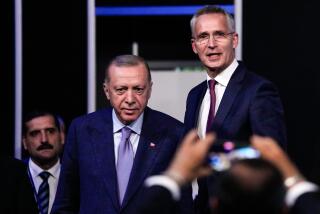Hands Across the Aegean
- Share via
The reconciliation that has been undertaken between the leaders of Turkey and Greece will obviously not resolve the historic disputes that have divided the two nations, but it happily reverses what had seemed to be an inevitable worsening of relations. Just a year ago, in a fresh quarrel over the exploitation of oil reserves under the Aegean Sea, they had seemed to be on the verge of open warfare.
The beneficiaries of this statesmanlike initiative will be the peoples of the two nations and their North Atlantic Treaty Organization allies. But the degree of benefit will depend on what is done now to press ahead with solutions to the outstanding problems, including their territorial counterclaims, and the future of Cyprus. Clearly the World Court could play a useful role in resolving the dispute over natural resources in the Aegean. And the United Nations, engaged since 1964 in maintaining peace on Cyprus between the Greek Cypriot majority and the Turkish Cypriot minority, could provide the basis for permanent settlement of that ancient rivalry.
The strong support that has been given by the United States to this effort at reconciliation is understandable, because Washington has faced difficult issues in its relations with the two allies. Greece’s Andreas Papandreou has suggested a national referendum before the military-bases agreement, expiring in December, is renewed. And a five-year extension of the Turkish bases agreement, negotiated last December with the government of Turgut Ozal, was subjected to a freeze on the ratification in Ankara over disagreements with U.S. policy.
As the East-West relationship is reworked through new treaties between Washington and Moscow, the solidarity of NATO takes on a special importance. Turkey has the longest frontier with the Soviet Union of all the allies, and, with Greece, forms the eastern anchor of the alliance.
All nations have something to learn from the refreshing candor of the Papandreou-Ozal communique, acknowledging that “the prime ministers agree that rigid frames of mind have been created in various segments of their societies in relation to existing issues.” The trick now will be in making the frames of mind more flexible.
More to Read
Sign up for Essential California
The most important California stories and recommendations in your inbox every morning.
You may occasionally receive promotional content from the Los Angeles Times.










